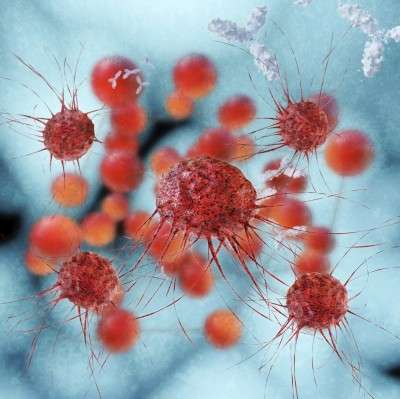New cancer vaccine one step closer

A team led by Monash University and the University of Queensland has developed a new approach to harnessing the body's immune system to fight disease that could pave the way for a new class of cancer vaccine.
The Monash-Queensland team's approach focuses on the dendritic cells – the sentinel cells of the immune system. Dendritic cells recognise dead and damaged body-cells such as those that represent cancer or infections, and have the potential to provide a powerful weapon against such disease.
The research potentially opens the way for new vaccines that can trigger dendritic cells to identify these invaders, launching a targeted immune response.
Dendritic cells are the body's first line of defense in alerting the immune system to the presence of foreign invaders in the body such as viruses, bacteria and parasites as well as tumour cells and other dead or damaged cells. Also known as antigen-presenting cells, dendritic cells effectively engulf components of these damaged cells, then present molecules from damaged cells to other immune cells, setting of a full blown immune response.
The research, published in the Journal of Clinical Investigation Insights, was led by Associate Professor Mireille Lahoud, from the Monash Biomedicine Discovery Institute, and Associate Professor Kristen Radford, from the Mater Medical Research Institute at the University of Queensland. The paper's first author is Kirsteen Tullett, a PhD student working jointly in the Lahoud/Radford labs.
Associate Professors Lahoud and Caminschi previously identified a protein called Clec9A that sits on the surface of dendritic cells and responds to dead and damaged cells, particularly associated with infectious diseases. Associate Professor Radford had previously identified the human dendritic cells best equipped to initiate the immune response to cancer cells. Importantly, they demonstrated that these are the dendritic cells that express Clec9A.
According to Associate Professor Lahoud, Clec9A has the potential to form the basis of a new, more modern class of vaccines that are more effective and have fewer side-effects. "By creating vaccines that bind to Clec9A, we can trick dendritic cells to think they have encountered a damaged cell and help to launch an immune response to the target infectious agent or cancer cells," Professor Lahoud said.
In this paper, the researchers have turned their attention to a dendritic-cell based vaccine against cancer. The researchers have developed "human chimaeric" antibodies that can be used to deliver vaccines to CLEC9A on human dendritic cells, thereby delivering the vaccine straight to the dendritic cells that are best able to initiate immune responses to cancer and infected cells. These antibodies potentially form the basis of a cancer vaccine that is highly targeted to removing the tumour cells with minimal side effects.
More information: Kirsteen M. Tullett et al. Targeting CLEC9A delivers antigen to human CD141+ DC for CD4+ and CD8+T cell recognition, JCI Insight (2016). DOI: 10.1172/jci.insight.87102
















